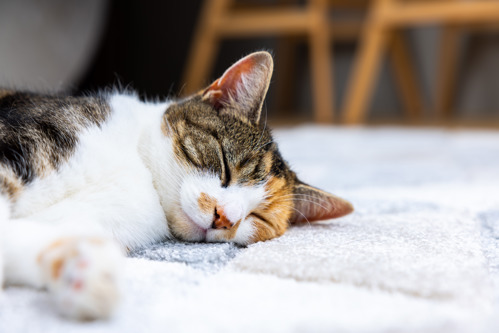Cat dribbling can be a sign of happiness or a health issue
Dribbling, drooling, salivating or slobbering. Whatever you call it, cats can dribble for a variety of reasons.
Veterinary Surgeon Sarah Elliott explains why it can be normal for cats to dribble, and when you should be concerned.

Normal causes of dribbling
Some cats drool when they are:
- relaxed and happy. Especially when accompanied by purring or kneading, drooling is thought to be a physiological response to pleasure. The act of kneading or purring releases feel-good hormones called endorphins in the brain. This helps reduce stress and anxiety and can sometimes lead to drooling
- being stroked. If your cat enjoys the interaction, drooling can be a sign of contentment. But if your cat is nervous or overstimulated, drooling might occur due to stress
That said, not all cats drool when they’re happy, and many never do. If your cat doesn’t dribble, that’s normal too.
Medical reasons for dribbling
Speak to your vet if your cat’s drooling is:
- new
- excessive
- constant
- smelly
These may point to a medical issue, such as:
- dental disease. Infections, gingivitis or broken teeth can cause pain and excessive salivation. Find out more about dental care
- foreign objects. Things like chicken bones or string can get lodged in the mouth or throat
- toxins or caustic substances. Cats may lick cleaning products, plants or chemicals, causing ulcers or chemical burns in the mouth. Find out more about poisoning in cats
- viral infections. Feline calicivirus is a common cause of ulcers in the mouth
- nausea. Seen with gastrointestinal issues, kidney disease, car sickness or even seizures. Cats often drool profusely after a car ride due to motion-induced nausea
- kidney disease. It can cause ulcers in the mouth, leading to discomfort and drooling. Find out more about kidney disease
- flat-faced breed trait: Cat breeds with flat faces, such as Persian cats, are known as brachycephalic breeds. They may drool as their short facial structure prevents their tongues from staying inside their mouths. Find out more about brachycephalic cats
Do cats dribble when stressed?
Stressful events like vet visits, car rides or loud noises can trigger temporary drooling. This is often short-lived and resolves once the cat calms down.
Do cats drool when sad?
Sadness in cats doesn’t usually present as drooling. Instead, drooling is more likely to be linked to pleasure, pain, nausea or illness.
Why is my cat dripping liquid?
If you mean from the mouth, this is drooling or dribbling. Occasional, light drooling usually means your cat is feeling happy and relaxed. But new, excessive or constant drooling could be caused by a medical problem.
If you mean from the back end, your cat might be experiencing digestive or urinary problems. Speak to your vet to find the cause. Find out more about digestive problems and urinary problems in cats.



